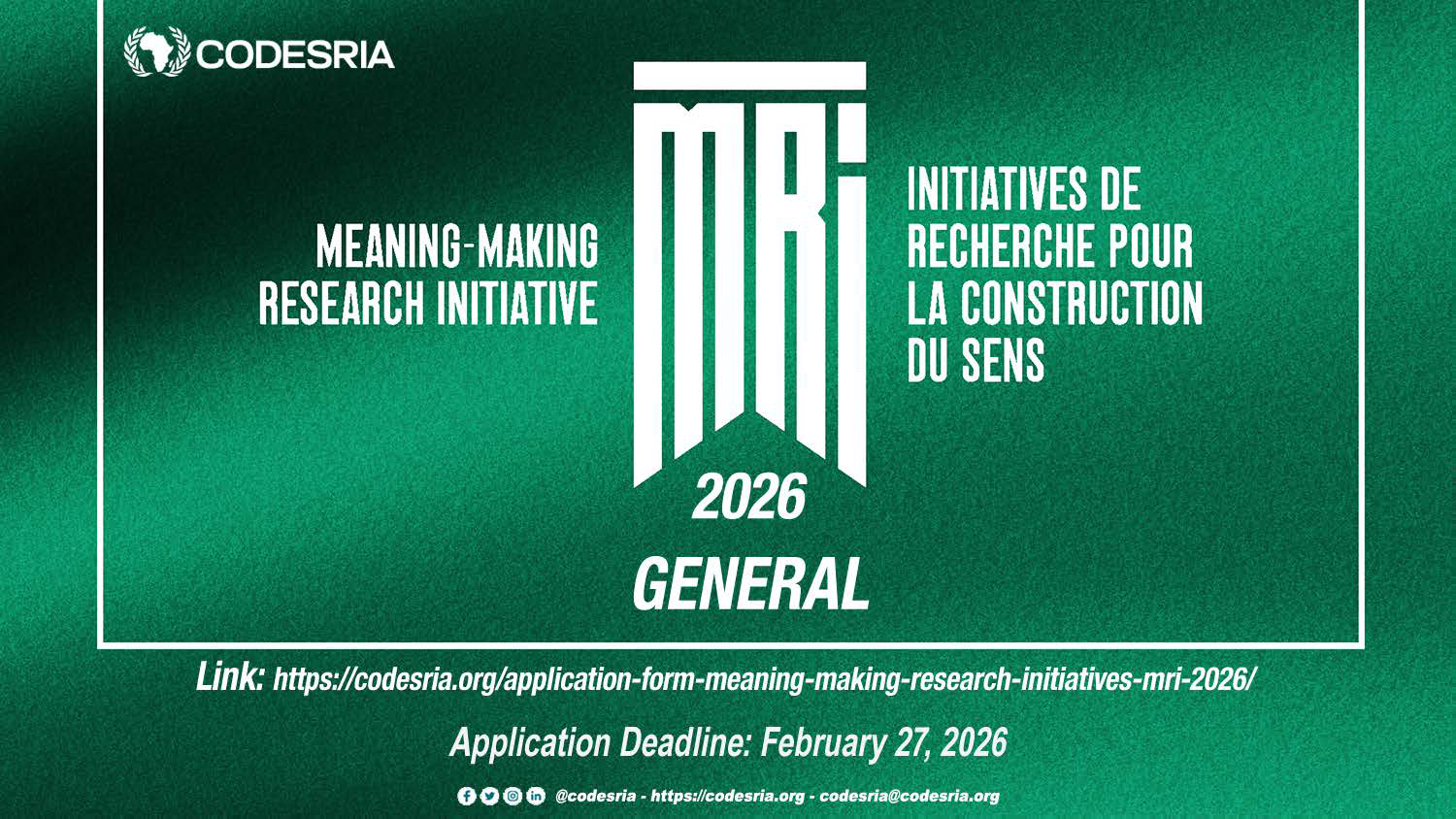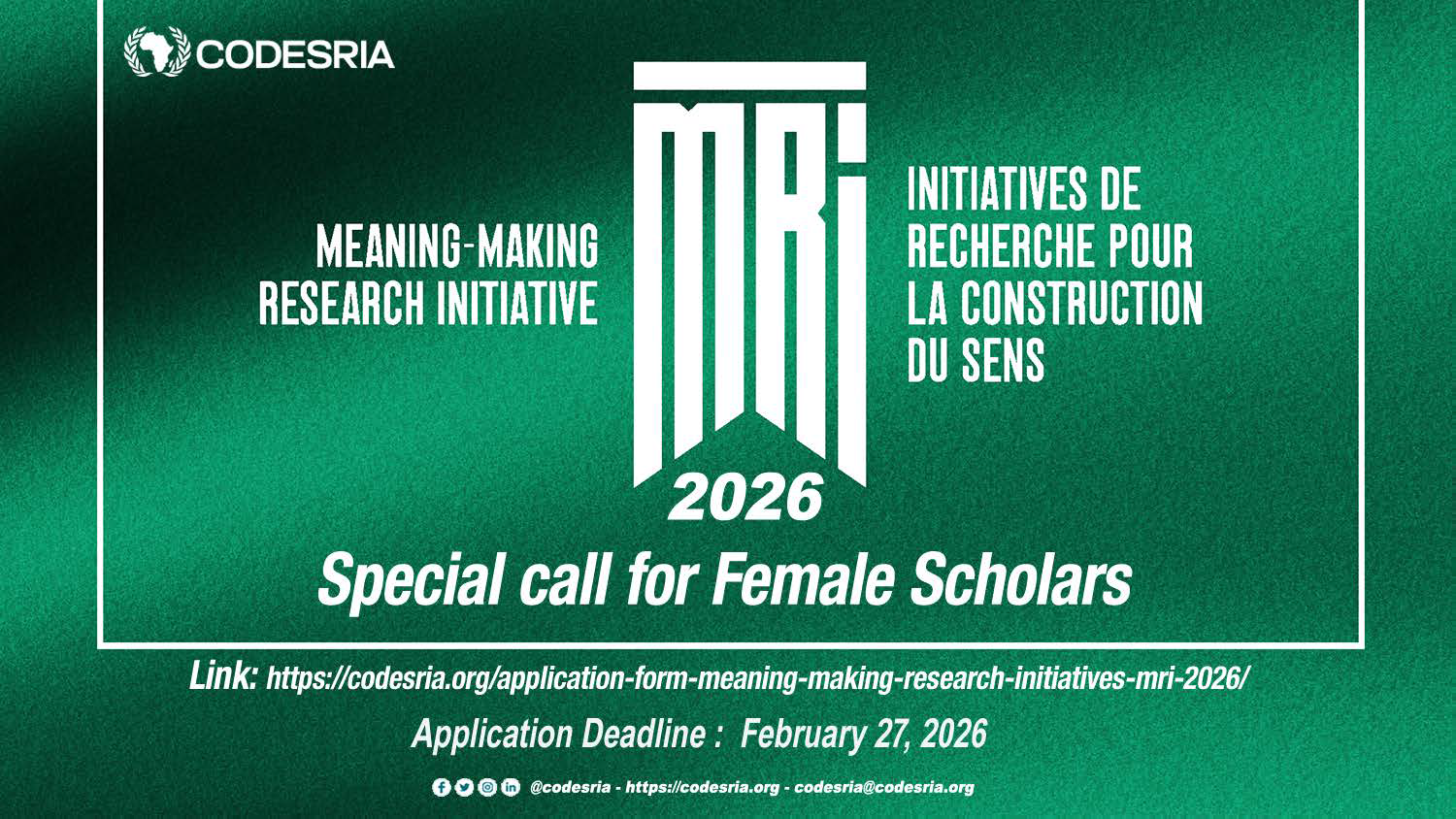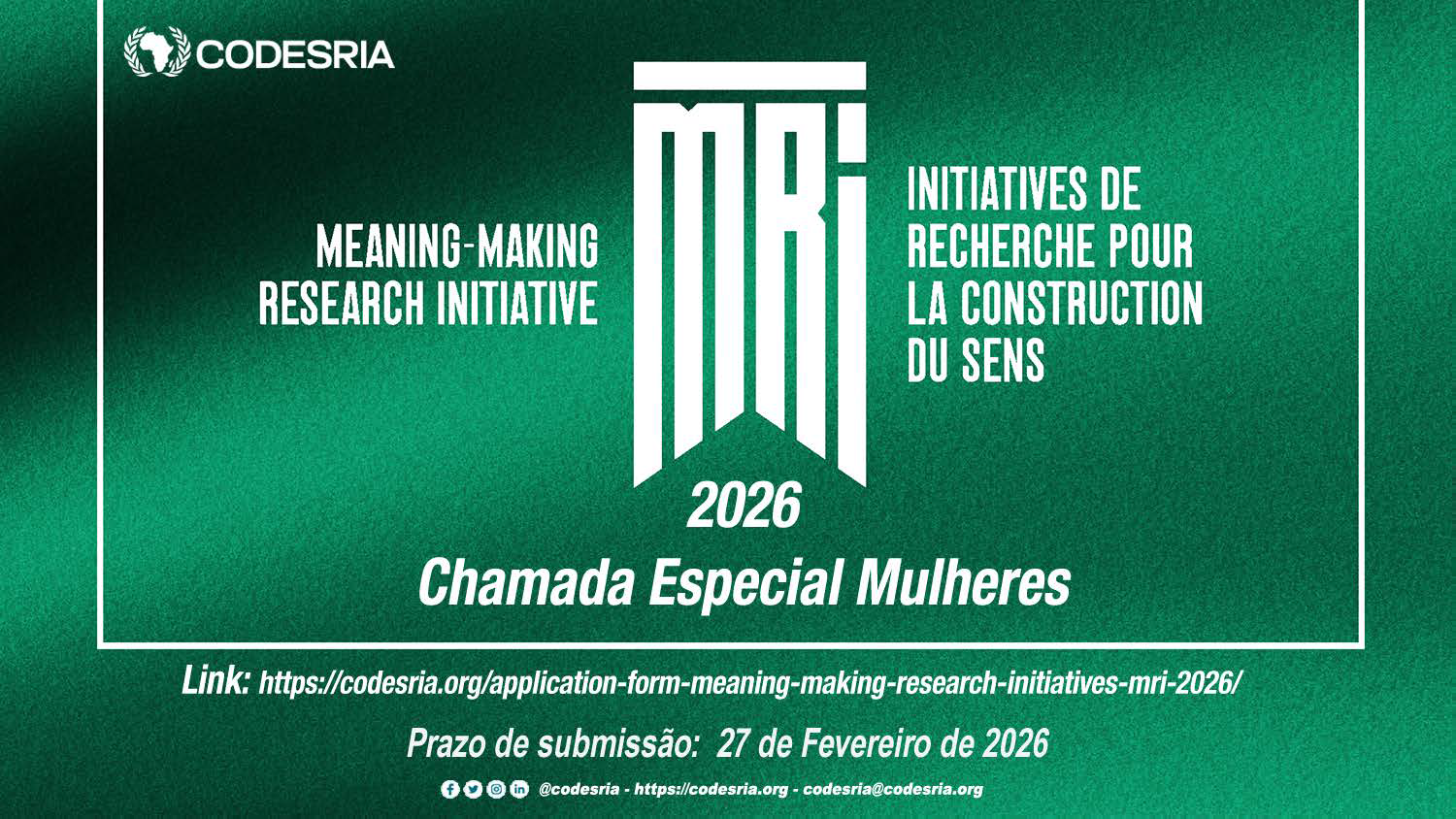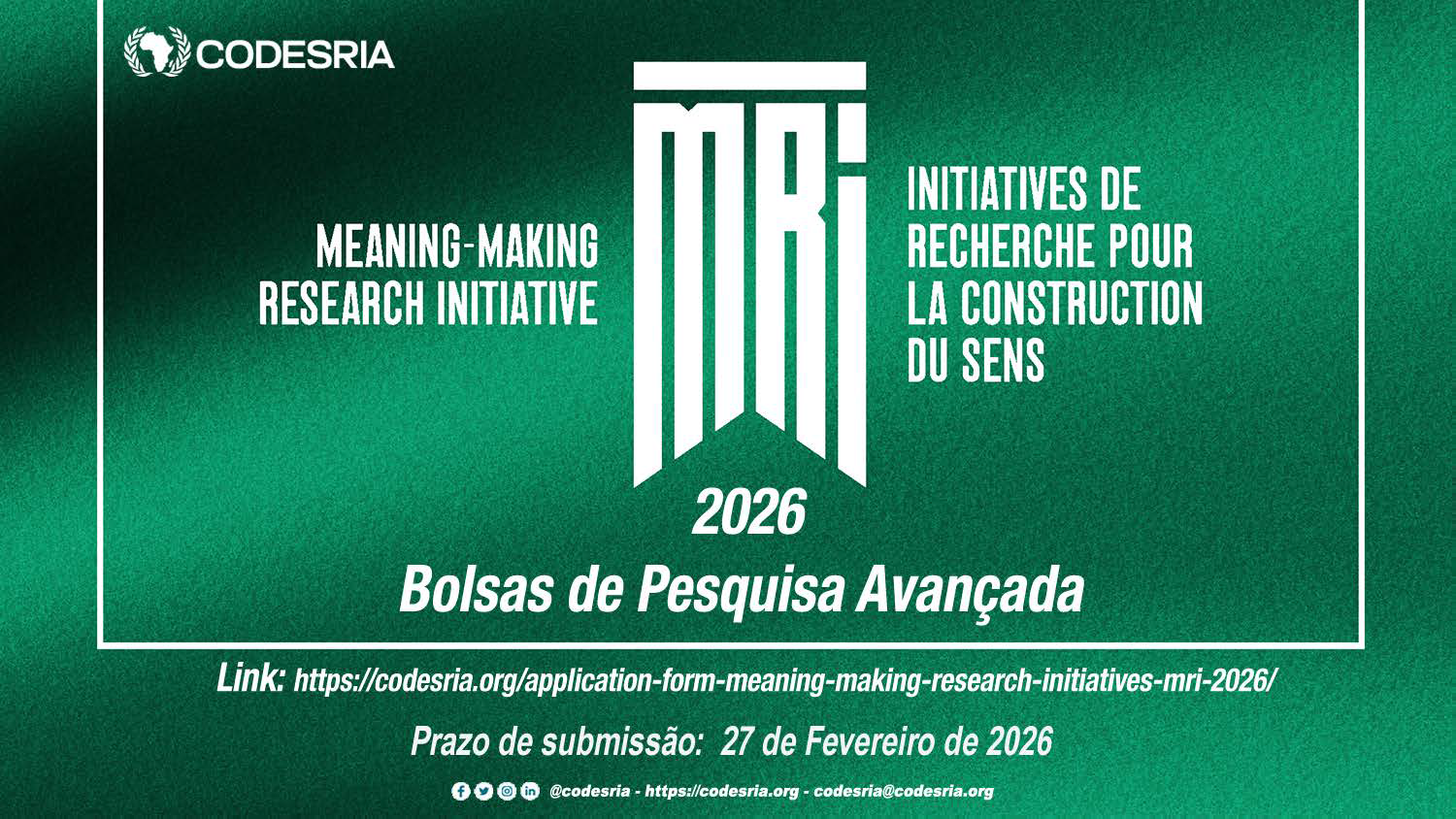Theme: Health, Environment and Development in Africa
Deadline: 15 June 2013
Date: 07 – 25 October 2013
Venue: Dakar, Senegal
2013 Session
Health, Politics and Society in Africa is one of the research themes identified by the last strategic plan of the Council for the Development of Social Science Research in Africa (CODESRIA) for 2007-2011. The theme falls within CODESRIA’s goal of revitalising and consolidating development thinking in Africa. Within the broad framework of the mandate defined for the Council in its Charter, various research and training programmes have been developed over the years for the purpose of both mobilizing the African scholarly community and responding to its needs. Training programmes have been conceived for younger and mid-career scholars who need support in advancing their reflections on conceptual and methodological questions. The Institute on Health, Politics and Society in Africa is part of those training programmes for younger scholars.
Objectives
The main objectives of the Institute on Health, Politics and Society are to:
![]() Encourage the emergence and sustenance of a networked community of younger African scholars in the field of health research;
Encourage the emergence and sustenance of a networked community of younger African scholars in the field of health research;
![]() Promote methodological and conceptual innovations in research on African health questions through the application of an enhanced social science approach;
Promote methodological and conceptual innovations in research on African health questions through the application of an enhanced social science approach;
![]() Develop a whole range of analytical tools capable of integrating Social Science approaches into health research in Africa;
Develop a whole range of analytical tools capable of integrating Social Science approaches into health research in Africa;
![]() Encourage a structured dialogue between the Social Sciences on the one hand, and the Health/Biomedical Sciences on the other hand, as part of the quest for a holistic approach to understanding the relationship between health, politics and society in Africa,
Encourage a structured dialogue between the Social Sciences on the one hand, and the Health/Biomedical Sciences on the other hand, as part of the quest for a holistic approach to understanding the relationship between health, politics and society in Africa,
![]() Promote the sharing of experiences among researchers, activists and policy makers drawn from different disciplines, methodological/conceptual orientations, and geographical areas.
Promote the sharing of experiences among researchers, activists and policy makers drawn from different disciplines, methodological/conceptual orientations, and geographical areas.
Organisation
The activities of all CODESRIA institutes centre on presentations made by researchers, resource persons, and the participants whose applications for admission as laureates are successful. The sessions are led by a scientific director who, with the help of resource persons, ensures that the laureates are exposed to the range of research and policy issues generated by or arising from the theme of the Institute for which he is responsible. Open discussions, drawing on books and articles relevant to the theme of the institute, are also encouraged. Each of the participants selected for any of the Council’s institutes as a laureate is required to prepare a research paper to be published by CODESRIA. For each institute, the CODESRIA Documentation and Information Centre (CODICE) prepares a comprehensive bibliography on the selected theme, and also facilitates access to a number of libraries and documentation centres in and around Dakar.
The 2013 Session: Health, Environment and Development in Africa
The theme of the 2013 session of the Institute on Health, Politics and Society in Africa is “Health, Environment and Development in Africa”. The interface between health and the environment is an overriding challenge for development in Africa today. In many African countries, health is often the source of the slow pace of development processes. The examples of AIDS and malaria are instructive for their negative impact on the economic growth of countries. Health is also adversely affected by these development processes and their corollaries, such as migration flows and the rapid urbanisation phenomena, which are difficult to manage. Indeed, the urbanisation of populations affected by humanitarian or security crises and their activities in urban territories contributes in no small measure to health hazards , notably through, air pollution, noise, overcrowding and stress, poor quality of water, waste disposal, and the proliferation of plastic bags; leading to another cycle of health, security and environmental crises.
On the other hand, with their integration in the global market, African economies become highly dependent on the environment and the exploitation of natural resources, both renewable and non-renewable. The share of the exploitation of natural resources in African countries’ GDP is more significant than that of their processing, and the environment is a substantial source of supply for medicines for African populations who are attached to their pharmacopoeia. Environmental degradation, therefore, causes greater vulnerability of economies and populations, proves to be a determinant at the source of not only human morbidity but also human mortality. There is broad consensus today in the research community that this environmental degradation is related to the climate change phenomenon. The latter is a threat to public health, and global warming entails adverse consequences for health by causing more storms, fires, and severe droughts that disrupt the supply of water, food, and medical services. Rising temperatures will increase the incidence of food- or water-borne infectious diseases. Air quality degradation will increase the prevalence of respiratory infections as well as the number of hospitalizations and non-work days. The frequency of heat waves will increase mortality. Those countries where malnutrition is widespread and infrastructures are inadequate will find it more difficult to face health risks due to climate change. In these circumstances, working out ways to mitigate the health effects of climate change may have beneficial consequences, especially for African countries reputed to be vulnerable. But the environment is not only physical; it also takes into account the socio-cultural aspects of the populations living there, in terms of norms, values and social practices which also pose health problems.
African Social Science researchers are therefore invited to reflect, taking into account the gender dimension, on the interface between health and the environment which is today an important issue for the development of the continent.
Eligibility and Selection
The Director:
For every session, CODESRIA appoints a director from the academic and research community, to provide intellectual leadership for the Institute. Directors are senior scholars well known for their expertise in the selected theme and for the originality of their thinking on it. The Director of the Institute will be required, among others, to:
![]() Identify resource-persons to help lead discussions and debates;
Identify resource-persons to help lead discussions and debates;
![]() Participate in the selection of laureates; comment on their projects to help them make necessary readjustments for publication;
Participate in the selection of laureates; comment on their projects to help them make necessary readjustments for publication;
![]() Design the course for the session, including the sub-themes;
Design the course for the session, including the sub-themes;
![]() Deliver a set of lectures and conduct a critical analysis of the papers presented by resource persons and laureates;
Deliver a set of lectures and conduct a critical analysis of the papers presented by resource persons and laureates;
![]() Submit a written scientific report one month after the end of the Institute.
Submit a written scientific report one month after the end of the Institute.
In addition, the Director is expected to (co-)edit the revised versions of the papers presented by the resource persons, with a view to submitting them for publication by CODESRIA.
Resource Persons
Lectures to be delivered at the Institute are not introductory courses. Rather, they are intended to offer laureates an opportunity to advance their reflections on the selected theme and on their own research topics. Resource persons are therefore senior or mid-career scholars who have published extensively on the theme, and who have significant contributions to make to debates on it.
Once selected, resource persons must:
![]() Interact with the Director of the Institute and laureates to help the latter readjust their research questions and their methodological approaches;
Interact with the Director of the Institute and laureates to help the latter readjust their research questions and their methodological approaches;
![]() Submit a copy of their course materials for reproduction and distribution to participants not later than one week before the lecture begins;
Submit a copy of their course materials for reproduction and distribution to participants not later than one week before the lecture begins;
![]() Deliver their lectures, participate in debates and comment on the research proposals and papers of the laureates;
Deliver their lectures, participate in debates and comment on the research proposals and papers of the laureates;
![]() Review and submit the revised version of their lecture notes or research papers for publication by CODESRIA, not later than two months after their presentation at the Institute.
Review and submit the revised version of their lecture notes or research papers for publication by CODESRIA, not later than two months after their presentation at the Institute.
Laureates
Applicants should be African researchers holding at least a Masters degree, with a proven capacity to carry out research on the theme of the Institute. Intellectuals active in the policy process and/or social movements and civil society organisations are also encouraged to apply. The number of places offered by CODESRIA at each session of its institutes is limited to fifteen (15). Non-African scholars who are able to raise funds for their participation may also apply for a limited number of places. An independent committee composed of outstanding academics and researchers will select the candidates to be admitted to the Institute.
Applications for the position of Resource Persons should include:
• an application letter;
• two published papers;
• a curriculum vitae;
•a proposal, not more than five (5) pages in length, outlining the issues to be covered in their proposed lecture.
Applications for Laureates should include:
• an application letter;
• a letter indicating institutional or organisational affiliation;
• a curriculum vitae;
• a research proposal (two copies) of not more than 10 pages, including a descriptive analysis of the work the applicant intends to undertake, an outline of the theoretical basis of the topic chosen by the applicant, and the relationship of the topic to the problematic and concerns of the theme of the 2013 Institute;
• two reference letters from scholars and/or researchers known for their competence and expertise in the candidate’s research area (geographic and disciplinary), including their names, addresses, telephone and/or fax numbers, and e-mail addresses; and
• a copy of passport
The deadline for the submission of applications is 15 June 2013, after which the Selection Committee composed of senior researchers will meet on the applications.
Laureates will be informed of the outcome of the selection process by late July 2013.
Laureates are expected to use the month of July to collect information and prepare the draft research papers to be presented during the Institute.
The revised papers should be submitted to CODESRIA not later than 20 September, 2013. All papers submitted should include a 300-word abstract that will be translated for all laureates who are to participate in the Institute. The Institute will be held in Dakar, Senegal, from 07 – 25 October, 2013.
All applications or requests for additional information should be sent to:
Institute on Health, Politics and Society in Africa
CODESRIA
Avenue Cheikh Anta Diop x Canal IV
BP: 3304, CP 18524
Tel: +221 33 25 98 21/22/23
Fax: (221)33 824 12 89
E-Mail: health.institute@codesria.sn
Website: https://codesria.org











